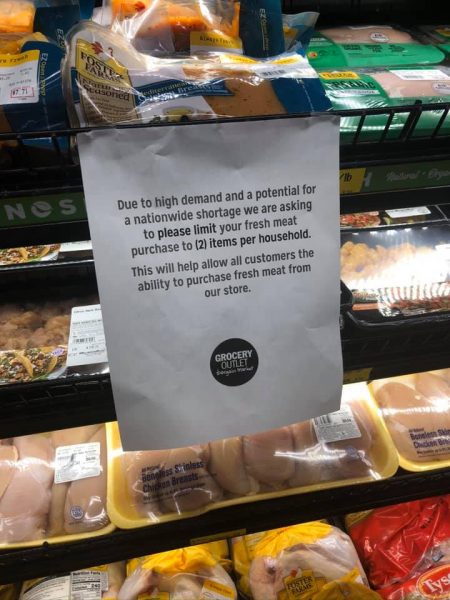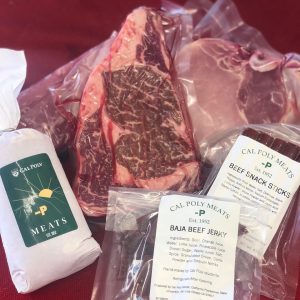Some local grocery stores are limiting meat purchases

- Grocery Outlet is limiting purchases to two packages of fresh meat of any type.
- Smart and Final is limiting customers to two packages of each kind of meat, such as two packages of beef, two of chicken, two of fish and two of pork.
- Von’s is also limiting purchases to two packages of each kind of meat, including at their butcher counter. There is no limit on the pounds per package at the butcher counter.
- As of Mon, May 11, Albertson’s, Walmart and Trader Joe’s have not put limits on meat purchases.
So far, no local stores are limiting the quantities of frozen meat, poultry or fish.
COVID-19 infections in meatpacking plants across the US have slowed down the national supply chain. Grocery stores are limiting the quantities purchased per visit to help prevent a rush on fresh meat that may cause serious shortages before the packing industry can recover.
The local ‘farm to fork’ fresh meat supply
Along with the grocery store supply of fresh meat that is dependent on the national supply chain, San Luis Obispo County has a flourishing fresh meat industry that is supplied by several local farms and ranches. Some beef, poultry, and pork is packaged and sold directly to consumers, some offer consumer the opportunity to buy whole steer or pig that is then processed and packaged. Some locally produced meat is available in small local stores.

Photo from Facebook
Local sources of fresh meat include:
- J&R Meats in Paso Robles and Templeton
- Cal Poly
- Larder Meat Company
- BeeWench Farm
- Templeton Hills Beef
- Adelaida Springs Ranch
In addition fresh meat is available from local stores such as Caliwala in Santa Margarita and Natures Touch Nursery and Harvest in Templeton. Nature’s Touch owner, Melanie Blankenship is also a local farmer.
Long time beef ranchers, and new arrivals on the “ranch to fork” scene is the Twissleman Ranch in Carrisa Plains. Kiah Twissleman said her family has been ranching on the Central Coast since 1884. “We just recently started selling our beef direct to consumer.” The ranch opened their gates to the public a few years ago after adding agrotourism to the ranch. “We started hearing more and more interest in beef purchased directly from the ranch. After the COVID-19 pandemic started, we saw a huge demand in our local community for locally grown beef and we decided it was time to step up to the plate.”
If fresh fish is a family favorite, Morro Bay fisherman are now selling fresh, seasonal catch of the day right off the boats. The endeavor, approved by the Morro Bay City Council, started on May 1. Signs along the Embarcadero direct people to the boats. Bring an ice chest with ice. Fish are sold whole and not filleted.
Members of the 4-H livestock projects are looking for buyer for their live animals. Contact your local 4-H club for more information. Another source for ranch and farm fresh meat and other produce is the EatWild website. Click California on the interactive map for more information.
The meatpacking industry and COVID-19
The United States Department of Agriculture (USDA) reports there are approximately 6,460 meat processing plants across the United States, and 675 in California. Meat+Poultry, the online news resource for the meat and poultry processing industry, is maintaining an interactive plant closure map. The map shows plants that are closed, open with limited operation and reopened. As of May 11, 48 plants, mostly in the Midwest are closed. The map is updated daily. The map does not show any current processing plant closures in California.
In a report released May 8, the Center for Disease Control reported that processing plant COVID-19 infections had reached 4913 with 20 deaths in 115 plants. The report states “Improving physical distancing, hand hygiene, cleaning and disinfection, and medical leave policies, and providing educational materials in languages spoken by workers might help reduce COVID-19 in these settings and help preserve the function of this critical infrastructure industry.”
Even though meat processing plants are being closed due to COVID-19 infections, the CDC reports,” Currently there is no evidence to support the transmission of COVID-19 associated with food.”
Comments
Jackie Iddings is a contributing reporter and photographer for the Paso Robles Daily News.





















